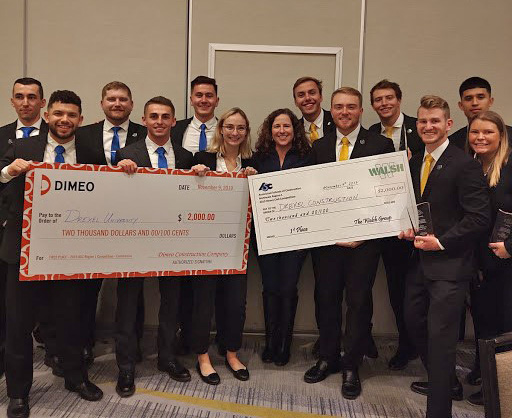The College of Engineering Construction Management Program (CMP) once again took first place in the annual Associated Schools of Construction Student Competition, Region 1, earlier this month, an event that Drexel University has dominated for the past five years.
Comprised of two six-member teams of undergraduates, CoE students won in the Commercial Building category, beating 11 other schools; and in the Heavy Civil category, beating six other schools to bring home the top prizes.

The Heavy Civil (left) and the Commercial Building teams both took first place at the ASC Student Competition.
The teams were scored on a variety of timed deliverables in the two-day, white-knuckle competition, which included responding comprehensively to a simulated request for proposal, compiling written reports, and presenting findings to industry sponsors who created the contest parameters and then served as the final arbiters on how effectively they were met.
The Associated Schools of Construction is the professional association of construction educators and industry practitioners working for the development and advancement of construction education. The annual competition is distributed among eight regions, including an international division. Region 1 was held in Albany, New York. Its sponsors were Dimeo Construction and Walsh Construction.
Dr. Christine Fiori, clinical professor and department head for Construction, Engineering and Project Management and Systems Engineering, coached the Heavy Civil Team. Dr. Kathleen Short, assistant teaching professor in the department, coached the Commercial Building team.
“Every group in the category gets the same problem statement. Each competition focuses on something a little bit different, but the bottom line is to pit the schools against each other to see which can come up with the best solution as they challenge our students with a real-world problem,” said Fiori, who has been coaching these competitions at several schools since 2002 and brings considerable know-how to the task. “The companies that sponsor the event often set up problems on something they’re looking to solve themselves.
“Our students do a great job,” she added. “We instill in them that they’re representing themselves, they’re representing the program, and they’re representing Drexel.”
The professors described a program of training and preparation that stretched throughout the fall term and required—along with project skills learned through coursework—a serious time commitment from the students who participated. They met twice a week leading up to the competition.
Team members included: Kevin Wilkison, Katie Tiarks, Christopher Torres, Christopher Vokes, Justin Schnepp and Tom Bell on the Commercial Building Team; and Eric Kasperowicz, Patricio Portillo, Chris Jager, Charles Benzing, Daria Neri, and John Card on the Heavy Civil Team.
“Drexel has dominated this competition because of the amount of time and effort we put into our preparation. We are committed to putting our best effort forward each and every year,” said Eric Kasperowicz, ’21, a member of the Heavy Civil team. “We treat the competition as if we are a real project team and need to prepare the best estimate possible in order to ‘win the job.’ ”
For the Commercial Building Team, sponsor Dimeo Construction solicited a request for proposal based on a project to renovate a historical building on a university campus. Students worked with the specs to run through a list of 15 timed deliverables including schedules, a safety plan, and even a permitting process that had them dashing throughout the event site and following clues.
“This competition improves my skills as an engineer because at the end of the day, engineers are problem solvers. You need to be able to be given a problem and determine a solution.”
Eric Kasperowicz ’21
“They’re having to think on the fly during this competition, just as you would on the job,” said Short. “When you’re in the field, you never know what’s going to happen and they throw that at them: how quickly they can work on their feet, how quickly they can resolve issues, how well they work together. So they’re looking at all of these things in our students.”
The Heavy Civil team was given a problem statement on flood control for a pump station in Edison, New Jersey by Walsh Construction. Team members had to create a coordination package for the project involving utilities existing underneath the station and severe restrictions with respect to the siting. The team focused on building a sheet-tile wall, completing an excavation, and pouring concrete behind the wall, and then coordinating with all the utilities.
All of this is completed in a simulated work environment—a hotel suite in upstate New York—within hours of receiving the problem statements and with visits by industry professionals throughout the day to monitor team progress.
“We were told that the project would be a sheet pile-supported flood protection wall outside of a pump station and that we should be able to takeoff, price, and determine means and methods for demolition, concrete, and structural excavation,” said Kasperowicz.
“This competition improves my skills because, at the end of the day, engineers are problem solvers,” he added. “You need to be able to be given a problem and determine a solution. This competition is just that. It replicates real-world pressure and time-crunch scenarios that we will all face in our professional lives. As we did in this competition and we will need to do as engineers, we remained calm and collected and used our skills, knowledge, and abilities to determine a solution.”